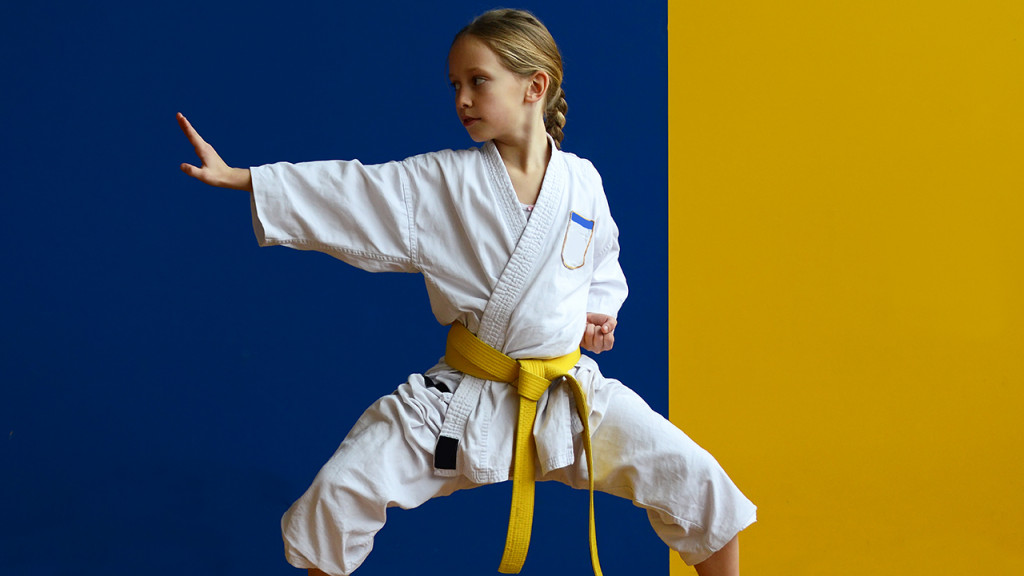How to pick the best martial arts class for your kid
Karate? Judo? Jiu-jitsu? With so many types of martial arts courses available, it can be hard to know how to choose the best one for your kid. Here's help.

At the beginning of every karate class, seven-year-old Weston sits completely still and meditates for two solid minutes. “He doesn’t even fidget,” says his mom, Stacey McDowall. Weston is a hyper kid who has trouble focusing, so being able to concentrate for that long is a huge feat, says McDowall. She calls enrolling him in martial arts at age four a total game-changer: “It has absolutely, hands-down improved his focus.”
Increased concentration is just one of the positive results that can come out of putting your kid in martial arts classes. They are great exercise, and a good martial arts studio puts special emphasis on respect, kindness, honesty, self-discipline and self-confidence.
But with many types of martial arts courses available, how do you choose the best one for your kid?
Finding the right studio
Each kind of martial arts has a different origin, style and technique. For example, karate has a strong focus on striking, whether with punches, kicks or knee strikes; certain styles of tae kwon do have an emphasis on kicking; while jiu-jitsu and aikido are grappling sports. To complicate matters, many modern studios incorporate more than one martial art into their classes.
But far more important than which form you select is the studio’s philosophy and teaching style, says Antoinette Moulton of DeSantos Premier Martial Arts in Toronto. She recommends asking studios about their approach rather than focusing too much on, say, karate versus judo.
A grpup of young kids runningPhysical activity can prevent depression in kids “What makes a good martial arts studio is if it’s a place where kids are happy, learn to love themselves and feel like they can come at any situation and not be fearful,” says Lizzy Stange, a Calgary mom of two. She grew up with a martial arts instructor for a dad and spent a portion of her childhood training in a hapkido studio—a style she chose to avoid with her children. “They tore you down,” she recalls. “They had a very traditional form of discipline.” For her kids, she picked a studio that encompasses a few different martial arts, like karate, kick-boxing and grappling; the lessons are taught in a more positive style, focusing on self-development and confidence rather than strictly learning to be a fighter.
Trying it out
Before committing to a studio, Moulton suggests sending your kid to a couple of trial classes to make sure they have fun and it’s a good fit. For example, if you have a kid with a lot of energy to burn, she probably won’t do well with an instructor who expects kids to stand still and listen to lengthy explanations. And if your child is quite sensitive, you’ll want to avoid an old-school studio, where a sensei might stand over the kids, yelling.
Moulton also suggests finding a school that offers different classes for different age groups rather than lumping five-year-olds in with tweens. “This is so they can focus on appropriate development for the age group,” she says. And you should be allowed to watch your kid while she’s training, Moulton says.
Will martial arts make my kid aggressive?
Many parents worry martial arts will promote violence, which was a concern for Ottawa mom Jennifer Feschuk, whose seven-year-old son, Alexander, began taking jiu-jitsu classes a few months ago. “I was hesitant at first,” she says. “But I learned it’s actually more about teaching the choreographies of movement than it is about violence. And his coach is an excellent role model for the kids. He inserts a lot of lessons about bullying and being self-confident.”
Moulton says parents ask her about the violence and brutality issue all the time, and she tells them she talks to her students regularly about rules and expectations. If you’re worried about the aggression factor, ask the instructor for their thoughts before you enrol.
It’s been almost three years since Weston took his first karate class, and the studio has become a positive community for him—a place he can go to burn energy and have fun kicking and punching, but also learn about respect, boundaries and impulse control. He now knows how to deflate aggression rather than promote it, and he has successfully defended himself on the playground using his karate techniques. Says McDowall: “For us, it’s been a great experience.”
Get involved
Looking to up your fitness game and bond with your kid? Try a parent-and-kid class. That’s what Mark McCann does with his seven-year- old, Jonathan. “I’ve thoroughly enjoyed it,” says McCann. “It’s a lot better than just sitting there for an hour.” They both have earned their yellow belts, and McCann hopes they’ll continue for the long run. “We are already close, being the only two boys in a family of five, but it’s a fun way to spend time as just the two of us.”
I think personally that the most important is what kind of values can be passed on my kid in the dojo or kung fu school. If it's respect, humbleness, self-confidence, peace in mind, then I am gonna send my son there. The effectiveness depends on person not a style, because every style can be effective in right hands, even sumo. :D